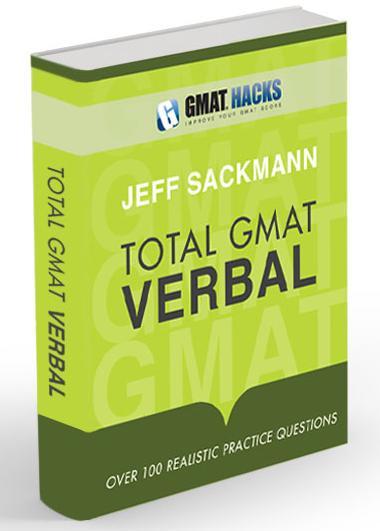
Bookshelf
|
|
Total GMAT Math Jeff's complete Quant guide, on sale now! |
|
|
Total GMAT Verbal Everything you need to ace GMAT Verbal! |
1,800 Practice Math Questions
Buy Jeff's books at Amazon.com

GMAT Official Guide, with IR
OG Math | OG Verbal
OG12 & Quant Rev solutions!
GMAT Question of the Day
Beginner's Guide to the GMAT
GMAT Hacks Affiliate Program

Recent Hacks

Categories
- General Study Tips
- Goals and Planning
- CAT Strategy
- The Mental Game
- GMAT Math Strategy
- GMAT Math Topics
- Mental Math
- Data Sufficiency
- Critical Reasoning
- Reading Comprehension
- Sentence Correction
- Analytical Writing Assessment
- Integrated Reasoning
- IR Explained
- Business School Admissions
- GMAT Prep Resources
- Practice Questions
- Total GMAT Math
- Total GMAT Verbal
- GMAT 111

How To Study GMAT Sentence Correction
| You should follow me on Twitter. While you're at it, take a moment to subscribe to GMAT Hacks via RSS or Email. |
As I've pointed out multiple times on this site, the way to maximize your GMAT study time is not by doing as many practice problems as you can, but by truly understanding a smaller number of questions. In short: quality, not quantity. I've offered plenty of detail about how to do quantitative questions that way, but it's a little more difficult to carefully analyze where you went wrong on a verbal question.
Of all the types of verbal questions, however, Sentence Correction is the most like math: they are usually short, and the test a finite number of rules. Just like the quantitative section, GMAT Sentence Correction doesn't test you on every grammar rule, or on the entirety of the English language. It focuses on a few rules, and expects that you know them inside and out.
What the GMAT Focuses On
Most SC questions hinge on a small number of grammatical concepts:
- Subject/verb agreement
- Modifiers
- Parallelism
- "Effective expression"
- Idioms
The first three of those are easy. If you don't know what they are, you ought to get a grammar book and study up. (There are a couple of pages in The Official Guide on these topics.) They come up again and again on the GMAT. The final two, however, are where you can really focus your practice.
A Gray Area
Some correct answers in GMAT Sentence Correction are just plain ugly. They are grammatically correct and usually superior to the other options, but they make you want to throw away the given sentence and start from scratch. For a test that purports to measure "effective expression"–not to mention measures your writing skills in the AWA–it requires you to approve of some quite inefficient language.
This is where doing a couple hundred Sentence Correction questions pays off. It takes time to get a sense of when ugly sentences are "ineffective" or just awkward. Truth be told, there are some types of awkwardness that would be permissible in one question and wrong in another. The only way to get a sense for those tricky situations is practice.
Idioms
Especially for those for whom English is not your first language, idioms can be the most difficult part of the test to master. Many students (including some who have spoken English since birth!) react to this by finding a long list (hundreds, sometimes) of idioms and trying to memorize them.
Don't do it.
As in the broader category of grammar rules, there are only a handful of idioms that are repeatedly tested on the GMAT. Sure, it's important to know when to use "less" and when to use "fewer," and you should have a pretty good sense of when various prepositions ("from", "of", "to", etc.) are correct. But time spent memorizing hundreds–even dozens–of idioms is barely better than time spent watching reality TV.
Vocabulary
I shouldn't have to say this, but I think I do. All over the internet, and in plenty of GMAT preparation materials, you'll find long lists of "GMAT words." These are also a waste of your time. The GMAT doesn't test vocabulary, and there is not a mysterious subset of words that come up frequently on the test. To be blunt, anybody who charges you for a list of "‘GMAT words" is misleading at best, a thief at worst.
So, Then, How To Study
Do some practice SC problems. You'll probably get a few wrong. There'll be a few others that you get right, but that you weren't sure about. (Put an asterisk next to those as you're working through the problem set.)
For every question you got wrong or weren't confident about, carefully read the explanation and figure out what makes the right answer right. (To a lesser extent, figure out what makes the wrong answers wrong.) Through that process, you'll get lots of reinforcement of the basic rules, and plenty of examples of when awkwardness is acceptable and unacceptable.
There are 138 practice SC questions in The Official Guide, and another hundred in the supplemental verbal book. That much practice–analyzed properly–will be enough to expose you to 99% or more of what you'll see on test day.
About the author: Jeff Sackmann has written many GMAT preparation books, including the popular Total GMAT Math, Total GMAT Verbal, and GMAT 111. He has also created explanations for problems in The Official Guide, as well as 1,800 practice GMAT math questions.
 |
Total GMAT Verbal
The comprehensive guide to the GMAT Verbal section. Recognize, dissect, and master every question type
you'll face on the test. Everything you need, all in one place, including 100+ realistic practice questions. |